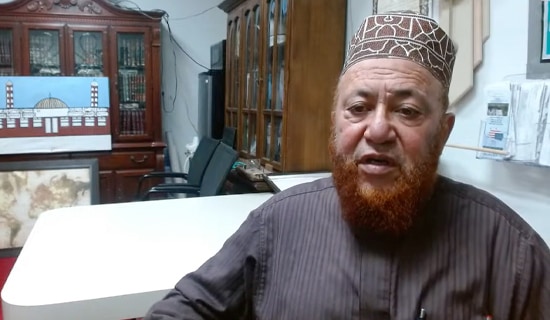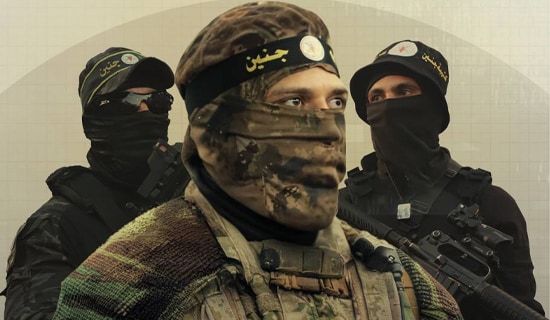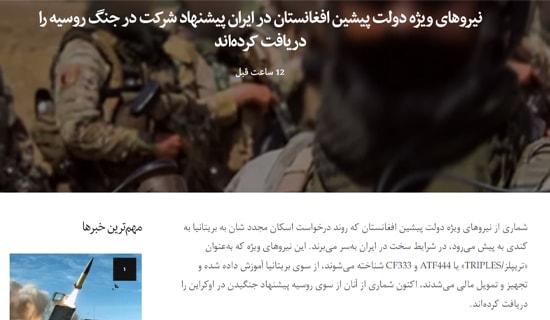In a February 2, 2019 interview with Iran's Channel 2 TV, Hossein Salami, deputy commander of Iran's Islamic Revolutionary Guards Corps (IRGC), explained the Iranian regime's "defense and deterrence strategy" in light of the threats against it. He said: "The two pillars of our deterrence are our influence in the region and our missile capability."
Contradicting Iranian regime spokemen's claim that Iran is forced to maintain missile capability and to expand in the region in order to defend itself against Western aggression, Salami revealed that Iran's expansion in the region (which stretches as far as 2,000 km from its border) is directed by the regime because "its essence is a matter of faith." That is, active geographic expansion is "a zero-sum game" played by the regime against its enemies, instead of being for purposes of defense. He explained that "the morale and the spirit of jihad against the controlling regime [i.e. the U.S.] and against the infidels are the internal faith of the region, [and therefore] no one can destroy the expansion of [Iran's] influence." He added: "We had two options: to remain within our geographic borders, meaning achieving the American aims, or to advance and move forward [towards countries far away from Iran]."

Hossein Salami in Channel 2 interview. Source: Fars, Iran, February 2, 2019.
Iranian spokesmen emphasize the regime's refusal to negotiate over its missile program, stating that Iran's missiles are its defense against its enemies. Nevertheless, its missiles have a range of up to 2,000 km,[1] indicating that the missile program is offensive, not defensive. Further underlining that Iran's missile program is offensive was Salami's warning in this interview that if Europe pressures Iran on this matter too much, the regime will take a "strategic leap" and will increase its missiles' range: "Our defensive strategy can change subject to circumstances, and also subject to changes in the behavior of the players [in the international arena]... The structure, organization, development, quantity, and quality of our missile capability are completely open-ended. We have set no limits for the development of this capability."
Salami said that the strategy for eradicating the "Zionist regime" has been created, hinting at Iran's regional expansion. Addressing Israel, he warned that its response to this strategy could spark a war in which its destruction is assured, that the Israelis would be destroyed before help from the U.S. could arrive, and that there would be no burial site for them in Palestine.
To view the clip of excerpts of his statements on MEMRI TV, click here or below:
The following are Salami's statements in his Channel 2 interview in full, as published on February 2, 2019 by the Iranian news agency Fars:
"We Have No Technical Limitation On Expanding The Range Of Our Missiles And Increasing Their Long-Range Accuracy"
"We are an independent and great country with powerful enemies on a global scale, and the[se enemies] have serious strategies to reduce and weaken our might. The enemies want to disarm the Iranian nation of its native might using psychological, political, and economic pressure. We have a completely independent defensive strategy, the main thrust of which is creating deterrence against the same great enemies that always threaten us. We have very valuable experience in using [our] missile force, gained in the last years of the Iran-Iraq war [1980-88] and also in the battles of the Palestinian and Lebanese Muslims against the Zionist regime...
"The development of missile capability for our country as the major force for deterrence and defense is a strategy that cannot be stopped, and cannot be reined in. This force depends only on the will of the great Iranian nation and on its fundamental policy, shaped by the Supreme Leader of the Revolution [Ali Khamenei]. Happily, today we have no technological limitation on expanding [our] missile power – i.e. increasing missile accuracy to 100[%], in the matter of fuel, of warheads, and of destructive and evasive power, and attaining full independence in all aspects of missile technology – and every day [our] missile capability and quality improve. We are developing these technical capabilities according to strategic considerations, and if we restrict the range of our missiles to a particular number [i.e. to a range of 2,000 km, as IRGC officials claim Iran has], it is for strategic reasons. [But] these strategies are not set [in stone].
"Those who hear what we are saying now [i.e. in this interview] must internalize this reality: We have no technical limitation on expanding the range of our missiles, increasing their long-range accuracy, and stepping up their destructive and propulsion power. Our defensive strategy can change subject to circumstances, and also according to changes in the behavior of the players [in the international arena]. If the Europeans or others want to act according to their scheme to disarm Iran of missiles, we will be forced into a strategic leap. We can change all the factors and elements in developing this might in the technological area."
"We Advise Everybody... Let Us Develop This [Missile] Force In Keeping With The Nature Of Our Defense Policy"
"We advise everybody: When it comes to the missile force of the Islamic Republic of Iran, let no one negotiate with us, recommend anything to us, or request anything from us. Let us develop this force in keeping with the nature of our defense policy. They should not force us to change our deterrence equation. It should be noted that as long as there is no change in our enemies' strategy and in their strategy of hostility – which includes economic sanctions, propaganda, and pressure [so that they] remain the regional power – our strategy too will remain the same.
"When the enemies continue to develop their missiles, spend billions of dollars to upgrade their military might, and threaten us – who could imagine that a nation or country like Iran would think of stopping development of [its] defensive and missile force?
"There is a need for constant development of [our] deterrent force, and happily today we are finding innovations in developing this aspect of might in the country, and are doing so both quantitatively and qualitatively. Our missile capability is not under fixed parameters. The structure, organization, development, quantity, and quality of our missile capability are completely open-ended. We have set no limits for the development of this capability. The threats against us have no limits, and they are particularly complex. We must have the might to defend our values, our independence, the integrity of our sovereignty, and our advancement and the glory of the nation... This missile capability is one of the pillars of [our] deterrent might."
"The Countries With A Hostile, Controlling Policy Towards Us Must Fear Our Response"
"The countries with a hostile, controlling policy towards us must fear our response. As long as we are strong, they will have no chance to control [us]. One of the greatest lessons we have learned over the past 40 years is that independence, might, and progress cannot be achieved without might. The reason for this is that in our world, the logic of might rules [in relations] among states. Our great enemies understand only the language of force, and if we cannot speak this language to them, they will speak to us in this way. If we do not have missile might, they will force all their will on us in order to control us. Our aim in developing our missile capability is to prevent war. If the enemy miscalculates, or makes a misstep, we can correct his calculations from the first moments, with genuine responses, and as he is acting, we will show him his mistake.
"The greater missile capability we have, the greater our political might. Today, diplomacy means nothing without power."
"We Aren't Only Thinking About Might, We Also Have A Desire To Use It"
"We have chosen independence combined with might. We aren't only thinking about might – we also have a desire to use it, because our political thinking has great support from the strength that is latent in society, which emerges as the diplomatic need increases.
"When the Americans failed in linking their military tools to their main aims in the region – [that is,] America's military power failed to support its political aims – they wanted to compensate for this military failure by developing infidel terrorism [i.e. the Islamic State (ISIS)]. In Iraq and Syria, and later in Lebanon, they lit the fire of the terrorist expansion, in order to rein in Iran's defensive and regional power, and in order to increase the instability in the region and break the chain of the [Islamic] resistance. Iran's national security was the ultimate target of these actions by America, and we had to do something to thwart this American strategy. [It was] the Americans who, with this [military] action, laid the infrastructure for Iran's influence and for the political magnificence of [Iran's] regime in the region."
"Our Game Against The Enemies Is A Zero-Sum Game"
"The resistance fronts have no physical meaning. They emerged from the spiritual identity of [the Islamic] regime [of Iran], and caused supplementary forces in the battle region to coalesce. We had to expel this danger [while] it was in provinces distant [from Iran], because if we did not, the danger would infiltrate our borders. The front that was created caused the American defeat. Our game against the enemies is a zero-sum game. We had two options: to remain within our geographic borders, meaning achieving the American aims, or to advance and move [towards countries far away from Iran]. The aspiration to control our country is always on the American political and security agenda, and on the agenda of the Zionist regime, England, and their allies in the region.
"Our movement was more spiritual in its shaping of a strategy aimed at defeating the enemies. In Lebanon, Syria, Palestine, and Iraq, there are forces that are strictly local. The enemy was forced to spent $7 trillion with no achievements because of this movement."
"If There Is Relative Security In Europe Today, It Is Because Of Iran... Europe Should Thank Us For Our Presence In The Region"
"The EU and the European countries should understand this reality: If there is relative security in Europe today, it is because of Iran, that defeated the infidel terrorist ISIS. Without our fight against terrorism, bombs would be shaking the heart of Europe. Europe should be grateful and thank us for our presence in the region and our fight against terrorism. Europe was meant to suffer greatly from it, and they themselves know that they have no ability to confront terrorism because of their security structure.
"The Europeans owe Iran, and I wonder why Europe has not stopped following America and speaking negatively on the issue of Iran's regional influence."
"Iran's Capability And Influence Beyond Its Borders Is Expanding"
"Iran's regional influence cannot be diminished, because its essence is a matter of faith. The morale and the spirit of jihad against the controlling regime [i.e. the U.S.] and against the infidels are the internal faith of the region, [and therefore] no one can destroy the expansion of [Iran's] influence and the connection between them. The political balance in Lebanon and in Iraq has shifted in favor of the resistance. Wherever there is possibility of free elections, the public elects whoever acts according to the rationale of the [Islamic] resistance. Europe, America, the Zionist regime, and some of the evil states in the region that seek to diminish our power know that the two pillars of our deterrence are our influence in the region and our missile capability."
"The adaptability of our defensive thought has prompted the creation of power and unity, whereas the defensive thought of the Americans is destroying the identity and investments of the nations of the region, and thus it creates enemies.
"Iran's capability and influence beyond its borders is a phenomenon that is spreading in the belief sphere of the peoples of the region. It has crossed the political classes and has reached the social classes."
"The Zionist Regime Sees That A Strategy To Eradicate It From The Face Of The Earth Has Been Created"
"Hizbullah today is the Muslim and Arab world's mighty pillar against the Zionist regime. The bold master of the [Islamic] resistance [i.e. Hizbullah secretary-general Hassan Nasrallah] speaks to the Zionists in such a way that they cannot respond. America's withdrawal from Syria was not a matter of choice, it was forced upon it, because if it did not withdraw, it would have had additional defeats...
"When the Zionist regime sees that a strategy to eradicate it from the face of the earth has been created, it wants to change it with a series of blind [military] operations.
"I warn the Zionist regime: You have no strategic depth, and your entire territory is smaller than [the area in which we operated] in two of our operations [in the Iran-Iraq war] – Fath Al-Mobin [in March 1982] and Beit Al-Moqaddas [to liberate Khorramshahr in April-May 1982] – and you are bringing yourselves close to perdition. Everyone knows that if they want to start a limited war against us, it will not be limited, and if the Israelis do anything to ignite a new war, their destruction will come. They must not rely on the Americans because they will be annihilated before the Americans arrive, and there will be no place to be buried in Palestine.
"We will continue with our previous strategy into the fifth decade of the Islamic Revolution. Today, our naval force is completely strategic. We have created an endless force for our air defense and on the ground, and it will continue [to increase]. We cannot give [details] about all the aspects of our destructive might."
[1] Iranian spokesmen have stressed that Iranian missiles have a range not exceeding 2,000 km, as a way of signaling to Europe that they are not aimed at it but can reach Israel, as long as the Iranian regime's red line against Israel and against American and Arab targets in the region is maintained. See MEMRI Special Dispatch No. 7191, Iranian Officials To Europe: Hands Off Our Ballistic Missiles – They're Not Aimed At You, And Can Even Serve Your Security Needs, November 21, 2017; MEMRI Inquiry & Analysis No. 1357, IRGC Commander Jafari In Message Meant To Reassure Europe: Right Now, We Are Settling For Missiles With 2,000-Km Range – A Range That Covers U.S. Forces In The Region, November 3, 2017; MEMRI Inquiry and Analysis No. 1298, According To Iranian Officials, Obama Administration Gave Unwritten Consent In The Nuclear Talks And In The JCPOA Negotiations For Iran To Develop Ballistic Missiles With A Range Of Only 2,000 km – That Is, Capable Of Striking Israel But Not Europe, February 2, 2017.





